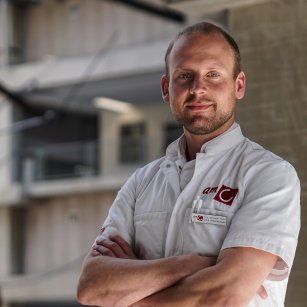NWO has awarded Veni grants to 200 promising researchers across all science domains. This funding will allow laureates to use this funding to further develop their own research ideas in the next three years. ACS researchers Inge Mulder, Barbara Verhaar, Jessie van Wezenbeek and Bram Hulst are four of the laureates.
Inge Mulder
‘Vascular Dysfunction in Acute Ischemic Stroke: Identifying and Targeting New Therapeutic Pathways'
Despite available treatment strategies for acute ischemic stroke, a significant proportion of patients do not achieve full recovery. My goal is to enhance post-stroke outcomes by deepening our fundamental understanding of brain-wide vascular dysfunction and impaired reperfusion after stroke. Specifically, I concentrate on the challenges posed by constriction and plugging of small brain vessels downstream from the initial obstruction. Through the integration of challenging rodent stroke models with cutting-edge imaging techniques, my aim is to pinpoint novel treatment targets and explore possibilities for more effective stroke management.
In her experiments, Inge will primarily use in vivo 2-photon imaging, which literally provides a unique glimpse into the brain. If you are interested in this technique or have a good idea for future collaborative projects, please send an email to i.mulder1@amsterdamumc.nl.
Barbara Verhaar
'The salty gut: on the crosstalk between sodium homeostasis and the gut microbiome'
High blood pressure is a leading cause of heart disease worldwide, and eating too much salt is a major contributor. However, not everyone’s blood pressure reacts the same way to high salt intake, and the reasons for this are not well understood. This project explores how salt-tolerant bacteria in the gut may influence how the body absorbs sodium and regulates blood pressure.
Jessie van Wezenbeek
'Right heart failure after receiving a left ventricular assist device: understanding, prediction and early detection'
Right heart failure is a common complication after implantation of a left ventricular assist device (LVAD) in end-stage heart failure patients, resulting in prolonged hospital stays and increased mortality. The aim of this study is to better understand, predict and detect right heart failure after LVAD implantation through detailed analyses of right heart function, right heart tissue and inflammation. This study will provide tools to improve patient selection for LVADs and enable timely intervention, ultimately leading to better care and outcomes for heart failure patients.
Bram Hulst
'Ketones for Kidneys'
When the body is under stress, it can transform fat and sugar into ketones, which organs use as an alternative energy source. Unlike regular energy sources, ketones need less oxygen to power cells. During heart surgery, patients receive anaesthesia and are connected to a heart-lung machine, which reduces blood flow and the delivery of oxygen to vital organs. This often leads to damage in vital organs such as the kidneys – a serious complication. This research will test whether giving ketones can protect kidney function and prevent damage due to reduced oxygen delivery during heart surgery. This discovery could provide doctors with a straightforward way to prevent kidney damage in heart surgery patients.
NWO Veni grant
Veni, together with Vidi and Vici, is part of the NWO Talent Program (formerly: the
Innovations Impulse). Veni is aimed at excellent researchers who have recently
gained their doctorates. Within the Talent Programme researchers are free to
submit their own subject for funding. In this way NWO encourages
curiosity-driven and innovative research. NWO selects researchers based on the
quality of the researcher, the innovative nature of the research, the expected
scientific impact of the research proposal and opportunities for knowledge
utilization. An overview of all laureates of this year can be found on the NWO website.



